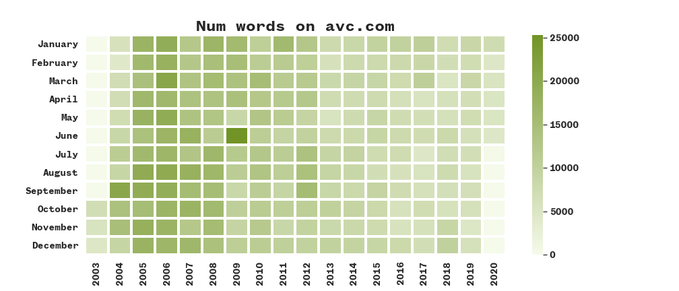Welcome to the new AVC. This is the third “iteration” of this blog.
The first iteration (AVC 1.0) was the Typepad era during which I redesigned AVC a number of times using Typepad’s tools. That lasted from September 2003 to February 2014.
About six years ago, we moved AVC to WordPress and did a significant redesign (AVC 2.0) and very little has changed since then.
AVC 2.0 had a nice long run and served its purpose very well.
But for most of the last year, I have wanted to make a number of changes to AVC:
1/ I wanted to move to a new host. I have been struggling to maintain the hosting infrastructure by myself and that has resulted in a number of outages, some only visible to me, some visible to all of you.
2/ I wanted to get a professional developer team involved that I can rely on from time to time to help me with technical issues.
3/ I wanted to improve search so that we can all find those old blog posts that we know exist but are no longer on the front page.
4/ I wanted to move to a more minimalist design where the blog posts are the main thing you notice when you come here.
5/ I wanted to find a way to continue to allow discussions without having to manage/maintain/moderate a full-blown comment community.
I am happy to report that I was able to do all of that with AVC 3.0:
1/ AVC is now running on Siteground. We continue to use Cloudflare for security and caching. We now use AWS for backups of the WordPress data.
2/ AVC is now supported by Storyware who will help me manage the hosting infrastructure and will be available to make tweaks to the UI when/if necessary.
3/ AVC search now runs on Algolia which will allow me to tweak and improve search relevancy over time to make it easier to find older blog posts.
4/ AVC has a sleek new design, made by Kirk Love, which is minimalist and copy centric.
5/ Comments are gone, replaced by a very cool WordPress/Twitter plugin developed by my colleague Nick Grossman which was built on top of this existing WordPress plugin.
Those are the big changes. Many things remain the same.
1/ You can continue to subscribe to AVC by email and RSS. We continue to use Feedblitz and Feedburner, respectively, to power that.
2/ We continue to maintain an archive of old blog posts by date and category and a specific archive for MBA Mondays.
3/ We continue to show full blog posts on the front page in reverse chronological order.
4/ We continue to run the USV Team Posts widget so you can see what my colleagues at USV are blogging about.
There are two important changes that I would like to talk about a bit more.
I have typically blogged every day, including weekends. I tend to post audio or video on Saturdays and write a regular blog post on Sundays. I am going to move to optional blogging on the weekends. I will sometimes write on Sundays and I will sometimes post audio or video on Saturdays. But I will not commit to doing that every weekend. I have already started to do this and some of you may have noticed it. You will notice this change in the About page.
AVC has always had comments. Initially on Typepad’s comment system. Then powered by Disqus, a former USV portfolio company. Disqus is a fantastic product, built and maintained by a terrific group of people. It is the best commenting system in the market by a very long shot. But managing, maintaining, and moderating a comment community is something that you must actively work on. I have done that assisted voluntarily by a number of AVC regulars, most notably William Mougayar, and also Shana Carp. I very much appreciate all the work they have done on this over the years. But I have tired of the work and I imagine that they have too.
So we have moved to hosting the discussions of AVC blog posts on Twitter. You will see two buttons at the bottom of a post. The first button allows anyone to easily post a comment as a reply to the @AVC tweet announcing a new blog post. The second button will allow you to see the entire comment thread on Twitter.
Kirk initially suggested this approach of using Twitter to host discussions to me. My colleague Nick developed the functionality and it has been running on his blog for a few weeks now. He built it on top of this existing WordPress to Twitter plugin. The “Discuss On Twitter” functionality is now running on USV.com in addition to Nick’s blog and AVC.
I think Twitter is a fantastic place to host discussions and I hope that other bloggers that use WordPress will adopt Nick’s plugin. And I plan to show this plugin to Jack and others at Twitter in the hopes that they will adopt it and make this a feature of Twitter than can run on all blogging platforms.
I hope you like AVC 3.0 as much as I do. And I hope that you will continue to get as much value out of it as I do.


